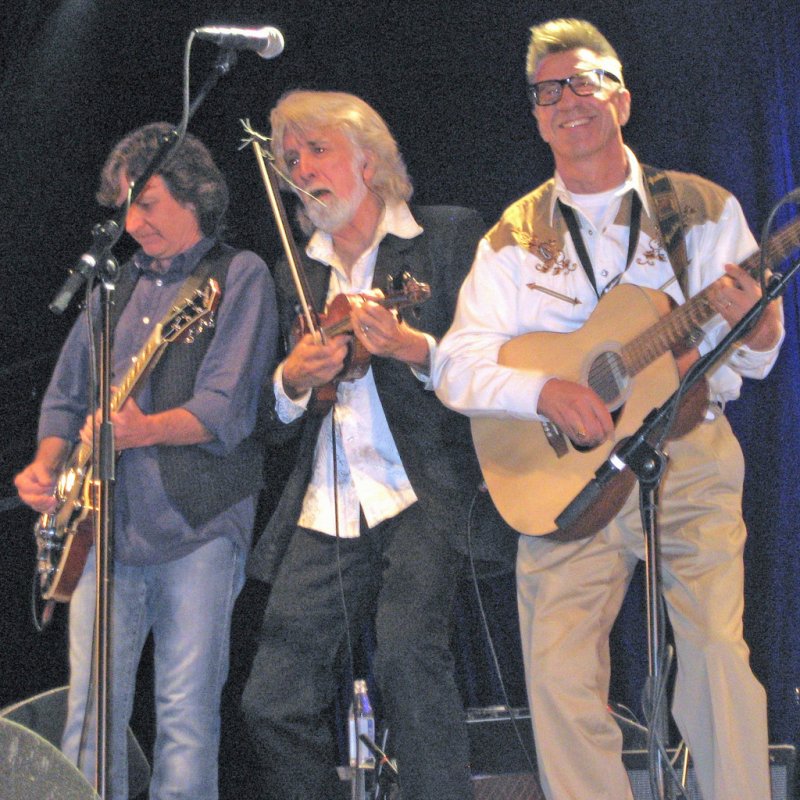Pete Anderson (R) is one of several seminal figures in the rise of rock 'n' roll behind the Iron Curtain who are at the center of "Rockin' the Kremlin," a feature documentary currently in production. Also pictured are members of the Nitty Gritty Dirt Band Jeff Hanna (L) and John McEuen (C) during a performance in Seijord, Norway. (Courtesy Douglas A. Yeager Productions Ltd.)
LOS ANGELES, Aug. 15 (UPI) -- Rockabilly star Pete Anderson is regarded as a national hero in his homeland of Latvia where the government has even issued a postage stamp in his honor -- quite a contrast to the days when the government threatened and brutalized him for playing rock 'n' roll without permission.
Born in 1945, Anderson grew up under Soviet repression, but like so many others of his generation -- perhaps to a greater degree than most -- he embraced rock 'n' roll and the promise of personal freedom inherent in the music Soviet governments tried, but never found a way, to control.
Anderson is one of several seminal figures in the rise of rock 'n' roll behind the Iron Curtain who are at the center of "Rockin' the Kremlin," a feature documentary currently in production. Director Jim Brown -- a four-time Emmy winning documentarian -- says the project focuses on the part rock 'n' roll played in bringing about the downfall of the Soviet Union by "transforming peoples' attitudes, especially young people, in the Soviet Union about the West."
Repressive governments were simply unable to keep rock 'n' roll outside the gates.
In an interview with United Press International, Brown said young people living behind the Iron Curtain "and having maybe a fairly bleak future were getting glimpses of American youth through the music that expressed freedom, being young, sexuality, just having fun with dancing, cars, surfing."
Combine that with an observation that "young people, teenagers, resent control," and you have to wonder whether the regime ever stood a chance in the 20th century battle of the bands.
Oddly enough, governments played a key role in setting up a milestone event in the long march of rock 'n' roll through the former Soviet Union -- the 1977 tour by the Nitty Gritty Dirt Band, following the band's phenomenal breakthrough success with its "Will the Circle Be Unbroken" album.
Washington had been trying to get American music across Soviet borders. Pete Seeger, Odetta and country star Roy Clark had played there but Soviet officials were "wary of rock 'n' roll coming in," Brown said.
Soviet officials agreed to bring in the Dirt Band, seeing them as an acoustic, folk act.
"The Dirt Band, as we all know, was really also an electric rock band," Brown said. "When they got over there they were treated like the Beatles."
Dirt Band founding member John McEuen told UPI the band made $5,000 per show on the 28-concert tour but "we would have done it for free."
"The (U.S.) cultural affairs liaison was more cutthroat than we were," McEuen said. "He reminded us, 'We're capitalists.'"
McEuen recalls the Dirt Band was shadowed during most of its stay by the KGB, but the former Soviet secret police agency kept a closer watch on local bands.
"There was a KGB agent in every band," he said.
The band met Anderson in Latvia during its tour, and McEuen and Anderson have remained friends. On July 31, Anderson joined the Dirt Band onstage for "Will the Circle Be Unbroken," "The Weight" and "Jambalaya" in Norway, where the Americans headlined the Seljord Country Music Festival.
It's been decades since Anderson was routinely threatened or beaten by officials and police but he recalls very well how difficult it was in those days.
"I clearly remember that I was just 14 years old when I realized that rock 'n' roll music is the best thing in the world, that I want to dedicate my life to," he told UPI.
At age 19, he formed his first "half-pro rockin' band," The Melody Makers. The band was booked to play a concert in Riga but the authorities canceled the show out of fear the young audience would get out of control, Anderson said.
The cancellation led to demonstrations, one of which featured a protest sign that read: "Freedom to guitar!"
Rock 'n' roll may seem to have gained the upper hand in its long-running conflict with repression but the bout is, evidently, not over.
"Rockin' the Kremlin" Producer Doug Yeager points out many of those who currently govern Russia, including former KGB official Vladimir Putin, came out of the security apparatus that controlled the Soviet Union.
"These people who used to refer to their political affiliation as Communist, now call themselves nationalists or democrats, but still maintain the same views on how to control their country," he said.
The Russian government exercises close control over much of the country's media and Yeager says even Russian radio, which is privately owned, is "pressured not to play music or artists that may be perceived as unsupportive of Putin's government."
Which raises the question, could the country be in for another outbreak of rock 'n' roll?
"Repression is often a catalyst for good music," Brown said.
Anderson says in "Rockin' the Kremlin": "Governments, they come and go -- but rock 'n' roll will never die."















